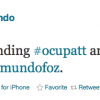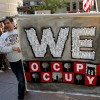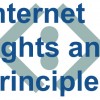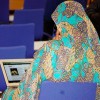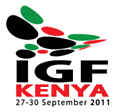Stories from October, 2011
Libya: Foreign Hackers and Surveillance
In the wake of the fall of Tripoli, reporters, researchers, and former employees of the Libyan Telecom and Technology company have been uncovering and sharing details about how the Libyan government surveilled and monitored internet and phone networks.
Egyptian Blogger's Summons Adds Fuel to Campaign Against Military Trials
Alaa Abd El Fattah, a well-known Egyptian blogger and activist who was imprisoned in 2006 under the Mubarak regime, learned on Monday that he has been summoned by a military prosecutor. He joins a growing list of Egyptian activists targeted by the military.
Syria: Prominent Blogger Disappears in Damascus
Syrian blogger Hussein Ghrer left his home in Damascus on Monday, October 24, and has not come back. He is a thirty-year-old married father of two. The most recent post on Ghrer's blog focuses on the arrest earlier this year of now-released Syrian blogger Anas Maarawi in the context of freedom in Syria.
Global Voices at the Silicon Valley Human Rights Summit
This week, San Francisco will play host to the Silicon Valley Human Rights Summit or RightsCon, a conference at which several members and friends of the Global Voices community will be speaking. The conference, hosted by digital human rights group Access, brings together companies from Silicon Valley and beyond alongside...
Tunisia: A chance to get things right?
At the Third Arab Bloggers Meeting in Tunis earlier this month, Moez Chakchouk, Chairman and CEO of the Tunisian Internet Agency, gave an amazing presentation in which he revealed that under Ben Ali, his agency had secretly tested censorship and surveillance software for Western companies. He wants to turn his agency into a transparent and neutral Internet exchange point. But whether he will succeed depends in part on the outcome of the October 23rd Constituent Assembly elections, and Tunisia's unfolding political process over the coming year.
Netizen Report: Occupy the Net Edition
This week we begin with Occupy Wall Street and the global "Occupy" protest movement: how the movement has galvanized hacktivists and citizen journalists, and how it has brought the issue of search and seizure of data on cellphone to the forefront in the United States and around the democratic world. We then move on to a roundup of the latest developments on surveillance and censorship, latest actions by companies both positive and negative, issues with Internet governance, and more. Don't forget to check out the list of upcoming events at the end of the post!
Making the Internet work for Human Rights: The Internet Rights and Principles Coalition
Dixie Hatwin, co-chair of the Dynamic Coalition on Internet Rights and Principles (IRP) of the Internet Governance Forum, introduces the IRP's work and its plans for the future. This post is part of a new initiative by Global Voices Advocacy to inform our community and the broader public about the issues, debates, organizations, and coalitions surrounding the policy and governance processes that will determine the Internet's future.
Internet Governance Commentary: Civil Society at a Crossroads
EDITOR'S NOTE: This post is part of a series of commentaries and guest contributions reflecting on the Internet Governance Forum and the future of global Internet governance. Governance of the Internet – a globally interconnected space upon which growing numbers of citizens, governments and companies all over the planet now...
What it is and why it matters: Developing Internet Policy at the IGF 2011 in Nairobi
There are many reasons why the Internet Governance Forum that took place last week in Nairobi was completely impossible: A lack of interest from established players who have become weary of the forum and the format, a long stream of stakeholders who couldn't afford to fly to Africa and ongoing United Nations orchestrated debates on the future of the IGF. Even so, thousands of people traveled to the United Nations office in Nairobi to discuss the future of internet policy.
BlueCoat: US technology surveilling Syrian citizens online
In the context of repression in the Middle East and North Africa, surveillance technology has played a key role in providing authoritarian regimes with the tools necessary to track citizens online. Among these companies, BlueCoat has proved to be the most efficient in helping the Syrian regime control every movement of Syrians on the Internet.
Netizen Report: Big Brother Edition
This edition of our new series on the power dynamics between governments, companies, and citizens covers a range of developments: the Internet Governance Forum; the 3rd Arab Bloggers Conference; the latest news in surveillance and censorship; the latest news from some of the world's biggest Internet companies that impact our lives; a list of interesting publications; and some events you may be interested in attending, either in person or remotely.
UAE Activists Face Trials for an Online Petition
An online petition is the only common factor between five detained activists in the United Arab Emirates. Ahmed Mansour, Nasser Bin Ghaith, Fahad Al-Sihhi, Hassan Ali Al Khamis, and Ahmed Abdulhaleq Ahmed are the names. Mansour is a well known blogger and an outspoken activist who is believed to have Muslim Brotherhood ties, while Bin Ghaith comes from a wealthy family and has served as a consultant for the army beside being a war veteran, a decorated pilot, a columnist, and a lecturer.


